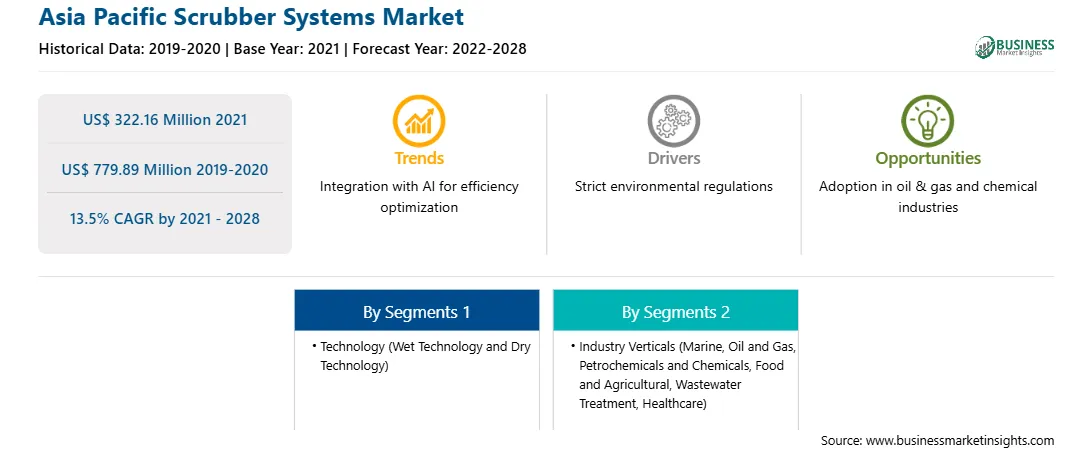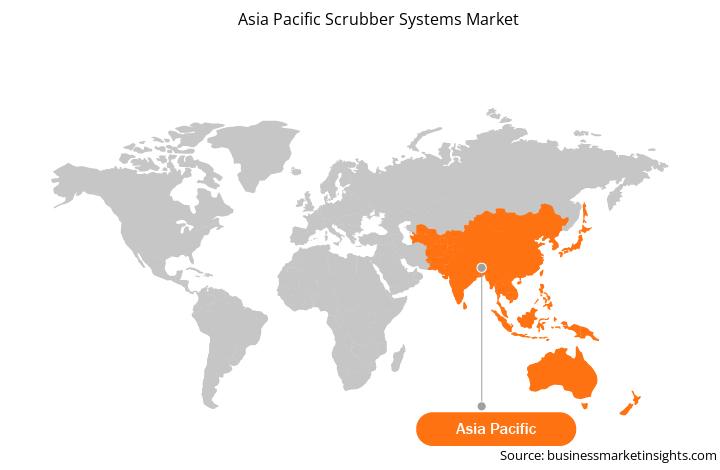Market Introduction
The APAC scrubber system fluids market is growing due to rapidly increasing drilling activities and growing oil & gas production volumes. In the Asia Pacific, the demand for scrubber systems is quickly rising due to the increased use of wet scrubbers, dry scrubbers, and absorbers in the marine and pharmaceuticals industries in China, Singapore, and Japan. International Maritime Organization (IMO) mandated ships to reduce SOx inside and outside the Sulfur Emission Control Areas (SECAs). In January 2015, IMO introduced norms to combat emissions from PMs and has diminished the sulfur release across the ECAs to 0.10%. Also, in 2016, the MEPC introduced a global limit of 0.5% on sulfur fuel content that came into effect from January 2020. Moreover, stringency in the regulations, rapid industrialization and rising concerns regarding air pollution is projected to stimulate the adoption of Exhaust Gas Cleaning (EGC) technology, popularly known as scrubbers and drive the market in this region. In addition, rising demand for retrofitting active vessels and substantial trade growth will boost the development of the scrubber system market in the area.
Countries in APAC, especially India, are highly affected due to the COVID-19 outbreak. APAC constitutes the world’s two most populated countries and prominent oil and gas producing and ship manufacturing countries. China, India, Japan, Singapore, and South Korea are a few prominent countries in the region. China is the major natural gas producing country in the region and had imposed strict lockdown and social isolation restrictions, which stopped exploration activities and reduced the demand for new oil and gas technologies across the country. The overall decline of E&P activities in the oil & gas industries hampered the demand for scrubber systems across APAC during the first two quarters of 2020. However, with the resumption, the exploration and manufacturing activities of several economies in the region supported the growth. For instance, in September 2020, Mitsubishi Shipbuilding Co., Ltd. announced of the successful installation of DIA-Sox, marine SOx scrubbers on 22 ships during 2020. Similarly, in November 2020, Wärtsilä received an order to install 25MW scrubber on Japanese shipyard—Very Large Crude Carrier (VLCC), which is supposed to be delivered in 2022. Thus, the market is projected to recover steadily in the coming years and gain traction for scrubber systems during the forecast period.
Strategic insights for the Asia Pacific Scrubber Systems provides data-driven analysis of the industry landscape, including current trends, key players, and regional nuances. These insights offer actionable recommendations, enabling readers to differentiate themselves from competitors by identifying untapped segments or developing unique value propositions. Leveraging data analytics, these insights help industry players anticipate the market shifts, whether investors, manufacturers, or other stakeholders. A future-oriented perspective is essential, helping stakeholders anticipate market shifts and position themselves for long-term success in this dynamic region. Ultimately, effective strategic insights empower readers to make informed decisions that drive profitability and achieve their business objectives within the market. The geographic scope of the Asia Pacific Scrubber Systems refers to the specific areas in which a business operates and competes. Understanding local distinctions, such as diverse consumer preferences (e.g., demand for specific plug types or battery backup durations), varying economic conditions, and regulatory environments, is crucial for tailoring strategies to specific markets. Businesses can expand their reach by identifying underserved areas or adapting their offerings to meet local demands. A clear market focus allows for more effective resource allocation, targeted marketing campaigns, and better positioning against local competitors, ultimately driving growth in those targeted areas.
Asia Pacific Scrubber Systems Strategic Insights

Asia Pacific Scrubber Systems Report Scope
Report Attribute
Details
Market size in 2021
US$ 322.16 Million
Market Size by 2028
US$ 779.89 Million
Global CAGR (2021 - 2028)
13.5%
Historical Data
2019-2020
Forecast period
2022-2028
Segments Covered
By Technology
By Industry Verticals
Regions and Countries Covered
Asia-Pacific
Market leaders and key company profiles
Asia Pacific Scrubber Systems Regional Insights

Market Overview and Dynamics
The APAC scrubber systems market is expected to grow from US$ 322.16 million in 2021 to US$ 779.89 million by 2028; it is estimated to grow at a CAGR of 13.5% from 2021 to 2028. Major manufacturing industries such as cement, glass, chemical and petrochemical, food and agriculture, and pharmaceuticals are known for harmful gas emissions. Hence, the stringent environmental regulations on these industries are driving the market. For instance, the cement industry is one of the major polluting industries as it releases nitrogen dioxide (NO2) and sulfur dioxide (SO2) particulate during production. The Indian government enforced the Air (Prevention and Control of Pollution) Act 1981. It amended it in 1987, which directs cement plants to obtain consent from the respective State Pollution Control Board (SPCB) for a specified period to establish or operate a production plant. It is renewed on submission of the previous year's compliance report. The Indian government also directs cement plants to install air quality monitoring devices for better inspections by the respective center and state agencies. Further, the glass manufacturing industry is known for its significant emissions of nitrogen oxide (NOx), sulfur dioxide (SO2), and particulate matter (PM). To curb the air pollution from the glass manufacturing industry, several countries forced this industry to install air pollution control devices to cut the emission of harmful gases and particulates. Thus, the stringent environmental regulations by various countries' governments are favoring the growth of the APAC scrubber system market.
Key Market Segments
In terms of technology, the wet technology segment accounted for the largest share of the APAC scrubber systems market in 2020. In terms of industry verticals, the marine segment held a larger market share of the APAC scrubber systems market in 2020.
Major Sources and Companies Listed
A few major primary and secondary sources referred to for preparing this report on the APAC scrubber systems market are company websites, annual reports, financial reports, national government documents, and statistical database, among others. Major companies listed in the report are Alfa Laval; Babcock & Wilcox Enterprises, Inc.; CECO Environmental; DuPont de Nemours, Inc.; FUJI ELECTRIC CO., LTD.; GEA Group AG; Hamon; Verantis Environmental Solutions Group; Wärtsilä Corporation; and Yara Marine Technologies.
Reasons to buy report
APAC Scrubber Systems Market Segmentation
APAC Scrubber Systems Market - By Technology
APAC Scrubber Systems Market -
By Industry Verticals
APAC Scrubber Systems Market - By Country
APAC Scrubber Systems Market - Company Profiles
The Asia Pacific Scrubber Systems Market is valued at US$ 322.16 Million in 2021, it is projected to reach US$ 779.89 Million by 2028.
As per our report Asia Pacific Scrubber Systems Market, the market size is valued at US$ 322.16 Million in 2021, projecting it to reach US$ 779.89 Million by 2028. This translates to a CAGR of approximately 13.5% during the forecast period.
The Asia Pacific Scrubber Systems Market report typically cover these key segments-
The historic period, base year, and forecast period can vary slightly depending on the specific market research report. However, for the Asia Pacific Scrubber Systems Market report:
The Asia Pacific Scrubber Systems Market is populated by several key players, each contributing to its growth and innovation. Some of the major players include:
The Asia Pacific Scrubber Systems Market report is valuable for diverse stakeholders, including:
Essentially, anyone involved in or considering involvement in the Asia Pacific Scrubber Systems Market value chain can benefit from the information contained in a comprehensive market report.